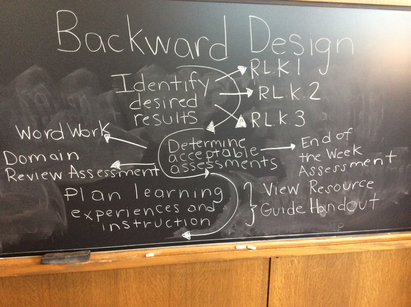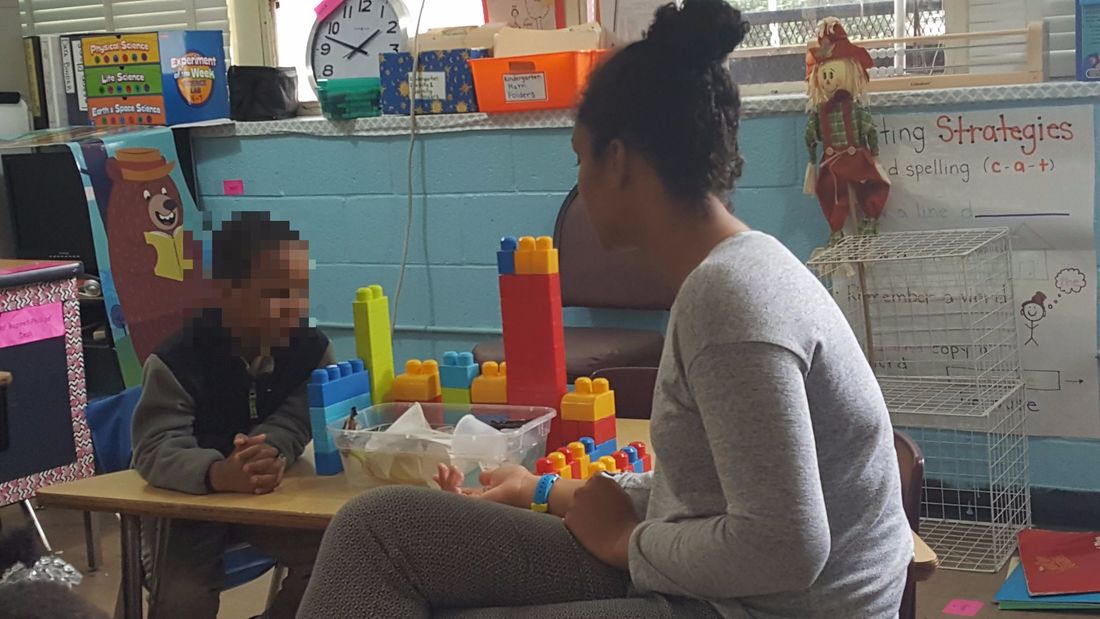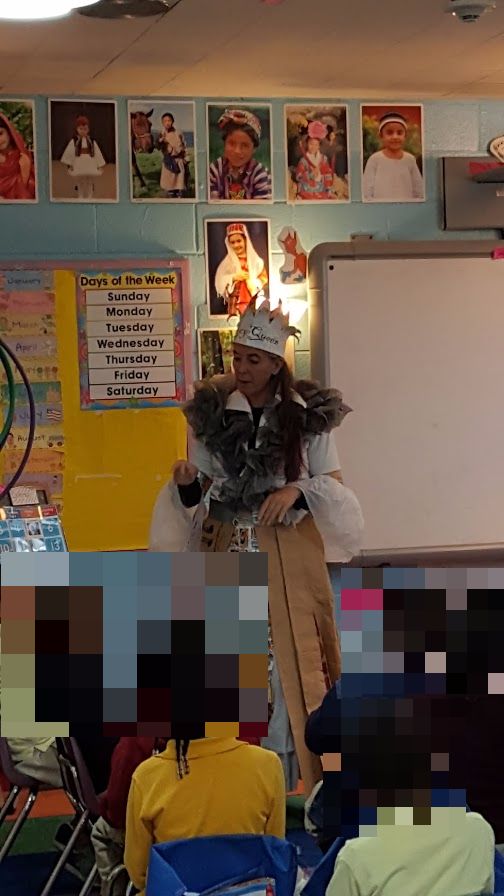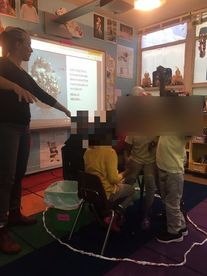- Home
- About Me
-
Teacher Growth
-
Assessment
>
- Assessment #1: Kindergarten Beginning of the Year Quick Assessment (BOY)
- Assessment #2: Easy CBM Middle of the Year (MOY) and End of the Year (EOY)
- Assessment #3: i-Ready End of the Year (EOY) Assessment
- Assessment #4: End of Unit Assessment/Domain Review Assessment
- Assessment #5: End of Week Assessment/Word Work Assessment
- Planning for Instruction >
- Instructional Strategies >
-
Assessment
>
-
Student Growth
The picture is an image taken during read-aloud time in my 1st grade classroom using the EngageNY curriculum. In an early childhood classroom, facilitating meaningful reading instruction cultivates a love for reading and grows each student's knowledge about the world around them with story books.
Unit Plan Example: Taking Care of the Earth
|
My planning leads towards achieving rigorous learning goals of on or above grade level performance by identifying on grade level proficiency benchmarks and creating a classroom environment where it is the expectation that students are meeting each benchmark.
I draw upon knowledge of content areas, curriculum ideas, cross-disciplinary skills, and pedagogy in my planning by first starting with the Engage NY curriculum, understanding the standards and then creatively planning for students to ascertain each skill necessary for mastery of foundational skills. Cross-disciplinary skills and pedagogy are integrated into this process of mastering foundational skills by incorporating experiential learning experiences and delving into texts, which allow students to view different perspectives. |
Common Core State Standards:
RL. K. 1 With prompting and support, ask and answer questions about key details in a text RL. K. 2 With prompting and support, identify the main topic and retell key details of a text RL. K. 3 With prompting and support, describe the connection between two individuals, events, ideas... |

The Taking Care of the Earth Unit plan was designed with the desired results at the forefront of the process, including students' mastery of three common core standards (RL.K.1, RL.K.2, and RL.K.3). The three acceptable assessments, which measure students' mastery include the word work assessments, end of week assessments throughout the unit, and an end of unit domain review assessment.
Unit Plan Daily Schedule
The Unit Plan Daily Schedule provides a general outline for instruction. The schedule lists activities for each day to provide a sequence of learning for students and teachers. The Unit Plan Daily Schedule creates checkpoints and benchmarks for student learning, in addition to serving as a template for instruction.
Resource Guide Handout
The resource guide above provides a table of resources used in the Unit Plan: Taking Care of the Earth. The resource guide was created in the course ED.813.668.9A.SP17 Materials for Teaching the Young Child Reading. The resource guide facilitated my creation of the unit plan below. The guide serves as an organizational document, which allowed me to complete step three of backward design, plan learning experiences and instruction based on previously determined desired results and assessments. I use all resources presented in the guide to deliver classroom instruction. However, when creating the unit plan, I added supplementary materials to enhance instruction and student learning.
Unit Plan: Taking Care of Earth
The Unit Plan above is an assembly of the EngageNY curriculum and teacher chosen resources, assessments, and instructional strategies to enhance plans for instruction and student learning. When planning for instruction and designing the unit plan I consider rigorous learning goals to influence my method of backwards design and infuse curriculum with knowledge of my classroom learners and community context to create meaningful instruction for all students.
Sample Lesson Plan: Word Work Conserve
Above is a sample lesson plan, which highlights the portion of the word work conserve lesson. This lesson portion structure and outline follows the Engage NY unit guidance and the word work assessment in general is outlined more in Assessment #5: End of Week Assessment/Word Work Assessment. The teacher influenced word work assessment is included to ensure literacy and vocabulary acquisition with writing and thinking. In this lesson, students are expected to verbalize their understanding of key details (content specific vocabulary), in addition to writing and applying the vocabulary to different contexts. The assessment is scaffolded for below grade level readers, on grade level readers, and above grade level readers to ensure individual student mastery and growth as a reader and writer.
Guided-Reading Instruction
Guided-reading articles are selected form Read Works digital to supplement the Engage NY unit Taking Care of Earth. The articles are taken from the Read Works created passage set, "Earth Helps Us, We Help Earth." Each article is assigned based on students lexile score on his or her Easy CBM assessment and there articles are shared in three groups: below grade level reader, on grade level reader, and above grade level reader.
|
Below Grade Level Reader
Read Works Article: Wow, Water! Science: Earth & Space Science
ReadWorks |
|
|
On Grade Level Reader
Read-Works Digital Article: How Plastic Is Recycled Science: Technology & Engineering
ReadWorks |
|
|
Above Grade Level Reader
Read-Works Digital Article: A Clean Drink of Water Social Studies: Geography & Societies
ReadWorks |
|
Teacher Chosen Resources and Instructional Strategies
Above are artifacts of e-mail communication between myself, the Waterfront Partnership and the community artist Bridget Parlato (Recy-Queen). Document number one is my initial EcoTour Request Form for the Waterfront Partnership field trip. The second image is an e-mail thread between Casey Merbler, Waterfront Partnership Education Coordinator, confirming my field trip. The third image is an e-mail, which Casey sent following the previous e-mail to share a grant funded idea for someone to come to my class and other classrooms in the school to talk more about the environment and recycling. The fourth image is an e-mail thread between Bridget Parlato and myself planning her visit to my classroom.
My Baltimore Book is a tool specific to the knowledge of learners and community context as it relates to taking care of the Earth. My Baltimore Book provided a preliminary literary introduction for all the teacher chosen resources and instructional strategies to follow.
The pictures above are from the Waterfront Partnership field trip. The Waterfront Partnership field trip was a great opportunity for students to use content specific vocabulary words and share their knowledge about taking care of our Earth, meeting rigorous learning goals. Students were excited to put literacy into action, when talking with Waterfront Partnership community stakeholders about how to keep our harbor clean and healthy. From this trip students also gained a sense of community context and an understanding of their greater role, as a citizen of Baltimore, in keeping our Earth clean and healthy.



